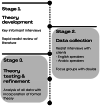Matching of woman and doula, and the generation of trust in an Australian volunteer doula program: Findings from a realist evaluation
- PMID: 35924682
- PMCID: PMC10087570
- DOI: 10.1111/hsc.13965
Matching of woman and doula, and the generation of trust in an Australian volunteer doula program: Findings from a realist evaluation
Abstract
How women are cared for while pregnant and having a new baby can have profound and lasting effects on their health and well-being. While mainstream maternity care systems aspire to provide care that is woman-centred, women with fewest social and economic resources often have reduced access. Community-based doula support programs offer complementary care for these women and are known to, on average, have positive outcomes. Less understood is how, when and why these programs work. A realist evaluation of an Australian volunteer doula program provided for women experiencing socioeconomic adversity explored these questions. The program provides free non-medical, social, emotional, and practical support by trained doulas during pregnancy, birth and new parenting. This paper reports the testing and refinement of one program theory from the larger study. The theory, previously developed from key informant interviews and rapid realist review of literature, hypothesised that the cultural matching of woman (client) and doula led to best outcomes. This was tested in realist interviews with women and focus groups with doulas, in January-February 2020. Seven English speaking, and six Arabic speaking clients were interviewed. Two focus groups were conducted with a total of eight doulas from diverse cultural and professional backgrounds. Data were analysed in NVivo. The study found cultural matching to be valued by some but not all women, and only when the doula was also genuinely interested, kind, timely and reliable. These approaches (with or without cultural matching) generate trust between the doula and woman. Trust theory, reflexivity theory and social relations theory supported explanatory understanding of the causal contribution of a doula knowing what it takes to build trust, to a woman deciding to trust her doula.
Keywords: culture; disadvantaged; doulas; pregnant women; realist evaluation; trust; volunteers.
© 2022 The Authors. Health and Social Care in the Community published by John Wiley & Sons Ltd.
Conflict of interest statement
The authors declare that there are no conflicts of interest for this project.
Figures
Similar articles
-
How and when doula support increases confidence in women experiencing socioeconomic adversity: Findings from a realist evaluation of an Australian volunteer doula program.PLoS One. 2022 Jun 30;17(6):e0270755. doi: 10.1371/journal.pone.0270755. eCollection 2022. PLoS One. 2022. PMID: 35771881 Free PMC article.
-
An Australian doula program for socially disadvantaged women: Developing realist evaluation theories.Women Birth. 2020 Sep;33(5):e438-e446. doi: 10.1016/j.wombi.2019.10.007. Epub 2019 Nov 24. Women Birth. 2020. PMID: 31776064
-
"Being the best person that they can be and the best mum": a qualitative study of community volunteer doula support for disadvantaged mothers before and after birth in England.BMC Pregnancy Childbirth. 2019 Jan 10;19(1):21. doi: 10.1186/s12884-018-2170-x. BMC Pregnancy Childbirth. 2019. PMID: 30630445 Free PMC article.
-
Multisite implementation of trained volunteer doula support for disadvantaged childbearing women: a mixed-methods evaluation.Southampton (UK): NIHR Journals Library; 2015 Mar. Southampton (UK): NIHR Journals Library; 2015 Mar. PMID: 25834865 Free Books & Documents. Review.
-
What, when, and how long? Doula time use in a community doula program in San Francisco, California.Womens Health (Lond). 2023 Jan-Dec;19:17455057231155302. doi: 10.1177/17455057231155302. Womens Health (Lond). 2023. PMID: 36869648 Free PMC article. Review.
Cited by
-
Use of volunteers in early years interventions for parents: A scoping review of roles and the extent of evaluation research in this area.PLoS One. 2024 Sep 26;19(9):e0305551. doi: 10.1371/journal.pone.0305551. eCollection 2024. PLoS One. 2024. PMID: 39325752 Free PMC article.
-
A Community-Informed Maternal and Infant Health Needs Assessment in Alabama.Matern Child Health J. 2024 Nov;28(11):1833-1839. doi: 10.1007/s10995-024-03988-2. Epub 2024 Sep 30. Matern Child Health J. 2024. PMID: 39347873 Free PMC article.
References
-
- Archer, M. S. (2003). Structure, agency and the internal conversation. Cambridge University Press.
-
- Archer, M. S. (2009). Conversations about reflexivity. Routledge.
-
- Awad, G. H. , Patall, E. A. , Rackley, K. R. , & Reilly, E. D. (2016). Recommendations for culturally sensitive research methods. Journal of Educational and Psychological Consultation, 26(3), 283–303. 10.1080/10474412.2015.1046600 - DOI
Publication types
MeSH terms
LinkOut - more resources
Full Text Sources


